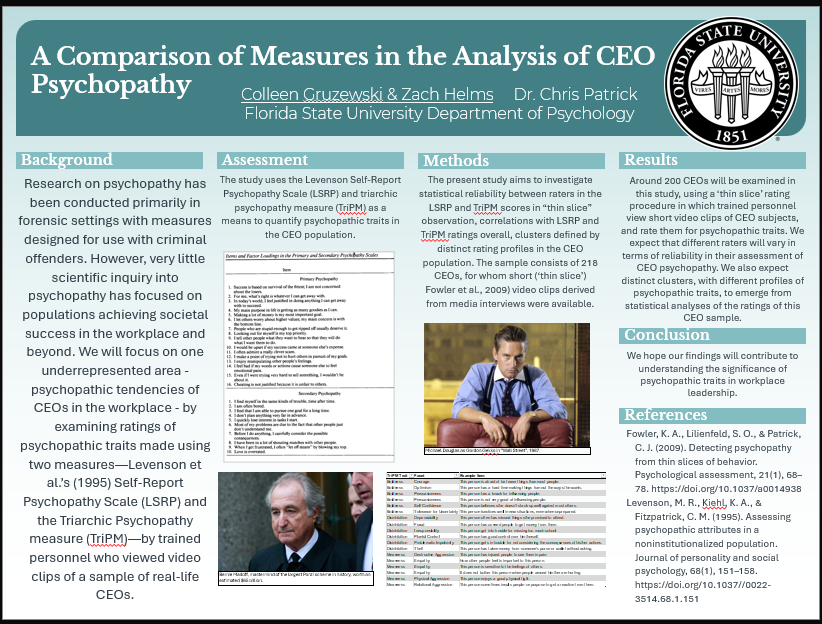Research Symposium
24th annual Undergraduate Research Symposium, April 3, 2024
Zach Helms Poster Session 3: 1:30 pm - 2:30 pm/75
BIO
Zach Helms is a third year Psychology and Criminology Double Major from Gulf Breeze Florida. His research interests include clinical assessment measures, antisocial behavior and its analogues, biological correlates to behavior, and forensic applications. After graduating, he aims to pursue his PhD in clinical psychology and become a practicing forensic psychologist.
A Comparison of Measures in the Analysis of CEO Psychopathy
Authors: Zach Helms, Dr. Christopher PatrickStudent Major: Psychology, Criminology
Mentor: Dr. Christopher Patrick
Mentor's Department: Department of Psychology Mentor's College: College of Arts and Sciences Co-Presenters: Colleen Gruzewski
Abstract
"Given that research on psychopathy was conducted for many years in forensic settings using measures designed for use with criminal offenders, the question arises: What do psychopathic individuals look like who are not behind bars – but instead have managed to achieve some degree of success in their occupational pursuits?” (Lowman, Bertoli & Patrick, 2018). While there evidently is a variety of research on criminal psychopathy, there appears to be a lack of understanding on how psychopathy can be applied to the workplace setting. Current research suggests that increasing interest in psychopathy in the workplace could be a valuable focus, yet there has not been adequate scientific research to characterize it effectively (Smith & Lilienfield, 2013). We will focus on one underrepresented area - psychopathic tendencies of CEOs in the workplace - through the Levenson Self-Report Psychopathy Scale (LSRP) and triarchic psychopathy measure (TriPM) ratings obtained through various statistical measures. More specifically, we are using the Levenson Self-Report Psychopathy Scale and the Psychopathic Personality. The study is currently ongoing and will be anticipated to conclude in April 2024. We hypothesize that our findings will point to a variety of psychopathy levels between CEOs, based on these scales. We hope that our findings will contribute to understanding the significance of psychopathic tendencies of leaders in the workplace.
Keywords: Psychology, Psychopathy, Ongoing


